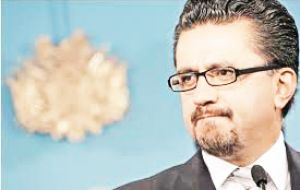MercoPress. South Atlantic News Agency
UN committee agrees on nine principles for restructuring sovereign debts
 “This constitutes a historic moment when it comes to resolving the issues of foreign debt restructuring,” said Llorenti, chair of the UN ad hoc committee
“This constitutes a historic moment when it comes to resolving the issues of foreign debt restructuring,” said Llorenti, chair of the UN ad hoc committee  Economist Joseph Stiglitz argued that the IMF control over debt restructuring didn't make sense because the IMF is an institution of creditors.
Economist Joseph Stiglitz argued that the IMF control over debt restructuring didn't make sense because the IMF is an institution of creditors.  Kozul-Wright described the committee's decision as an important step that UNCTAD had been advocating for the past 30 years.
Kozul-Wright described the committee's decision as an important step that UNCTAD had been advocating for the past 30 years. A United Nations committee, after six months work, on Tuesday, unanimously adopted a “historic” report that establishes nine principles for restructuring sovereign debt, the committee's chair Sacha Llorenti of Bolivia told reporters.
“This constitutes a historic moment when it comes to resolving the issues of foreign debt restructuring,” Llorenti, who chairs the UN ad hoc committee on sovereign debt restructuring processes, said at a press conference in New York.
The principles include the right of sovereign states to restructure their debt; sovereign immunity; good faith; transparency; impartiality; equal treatment; legitimacy; sustainability; and respect for majority decision in restructuring processes.
However, Llorenti noted that 11 countries had not supported the establishment of the committee in December 2014 and that these same countries had a greater share of the votes at the International Monetary Fund, which currently controls debt sovereignty issues.
U.S. Economist Joseph Stiglitz told the committee in a keynote address that the International Monetary Fund (IMF) control over debt restructuring didn't make sense because the IMF is an institution of creditors.
“The IMF is an institution of creditors, you would not ask Citibank to design the bankruptcy law in the United States,” he said, referring to the major U.S. bank. “We need a fair bankruptcy law an efficient bankruptcy law and the bankruptcy laws that come out of creditors are neither fair nor efficient.”
Stiglitz also pointed to Greece and Argentina as recent examples of countries that have suffered because of inadequate frameworks for debt restructuring.
“In the absence of an adequate framework for debt restructuring economies often go into deep recession -- depressions as we see today in Greece -- as we saw in Argentina,” he said.
Richard Kozul-Wright, strategies director of the United Nations Conference on Trade and Development (UNCTAD), told the press that part of the problem was that the same rules and practices that had been created at national levels to manage debts, did not exist at the international level.
“At the international level where we have also high levels of indebtedness there is no equivalent of national bankruptcy laws and it's a major gap in the international system,” he said.
Kozul-Wright described the committee's decision as an important step that UNCTAD had been advocating for the past 30 years.
“This is a very important first stage in moving towards a more rational way of handling sovereign debt crises from the very fragmented unfair system that we have,” he said.
The document will now be subject to a vote by UN member countries in a meeting which is expected to take place at the start of September.




Top Comments
Disclaimer & comment rules-

-

-

Read all commentsYes, it is terribly annoying that countries are forever FORCED to take on debt.... oh wait, they don't have to borrow money if they don't want to?
Jul 29th, 2015 - 07:11 am 0If you borrow, pay.
If you can't pay, then restructure.
But if you default, then don't go and crow about how much money you have and how prosperous you are just a couple of years later.
Stiglitz is in the pay of Argentine government, what a surprise.
Jul 29th, 2015 - 10:20 am 0You wouldnt ask serial debtors to design a bankruptcy law either.
If the credit terms are so loose and so open that you can ride a set of coach and horses through it, as this report proposes, then creditors will go somewhere else with their money, and those countries that need support will just fail immediately instead.
Anybody know which countries were represented on this 'ad-hoc' committee?
Jul 29th, 2015 - 11:05 am 0Commenting for this story is now closed.
If you have a Facebook account, become a fan and comment on our Facebook Page!